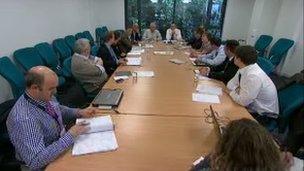Cornwall summit agrees to maintain 'pasty tax' pressure
- Published

The summit raised concerns about the VAT plans
Bakers, politicians and tax experts in Devon and Cornwall have said they will continue to protest against the so-called "pasty tax".
The government announced in the Budget that 20% VAT would be added to the price of hot savoury food from October.
At a summit held in Truro, Liberal Democrat MP Stephen Gilbert said there was nationwide opposition to the plans.
The government said VAT needed to be "fairly applied" to all hot food.
The bakery industry is one of the South West's largest manufacturing sectors, and it is feared that jobs could be lost; not only in pasty making, but also in farming, distribution and retail.
'Major issue'
The summit, held on Wednesday, was organised by accountancy firm Francis Clarke, which has been been asked to submit evidence to the Treasury Select Committee on the subject.
Delegates included representatives from the Cornish Pasty Association, and bakers including Cornwall's Oggy Oggy Pasty Company and the Devon-based Ivor Dewdney Bakery.
Francis Clarke partner John Endacott said: "I think it's clear that people believe that pressure needs to applied to the government."
Mr Gilbert, MP for Newquay and St Austell, said that opposition to the levy stretched from Cornwall to "meat and potato pie" constituencies in the north of England.
He said: "I think the chancellor has been reading the papers and will realise that it is a major issue, not just in Cornwall, but across the country."
VAT is not charged on most food and drink - or hot baked goods - but is payable on takeaway food sold to be eaten hot.
Ministers said all food sold "above ambient temperature" should carry VAT.
Oggy Oggy Pasty managing director Brian Stanleick said that he believed that the speed of the proposed VAT rise also caused concerns.
He said: "What they [the government] forget is that, for fish and chips, their VAT was first 5%, then 7%, then 10%; and over 20 years it went to 20%.
"Their customers gently, gently accepted it. We're being asked overnight to absorb it."
The government is consulting on the proposed changes. The deadline for responses is 4 May.
- Published10 April 2012
- Published31 March 2012
- Published29 March 2012
- Published23 March 2012